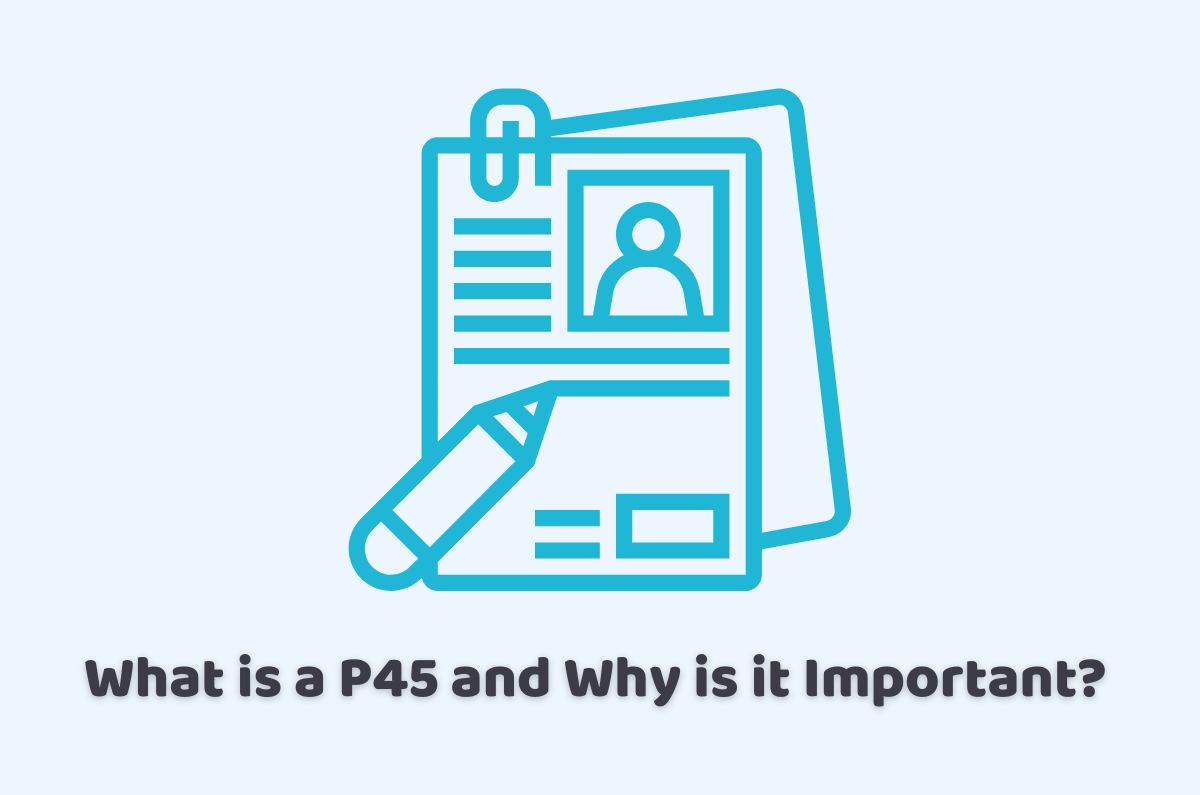
01/02/2024tax , Tax Issues , Taxation
What is P45? The P45 form contains information about the employee’s tax and National Insurance contributions during their employment and is essential in ensuring that the employee’s tax and National Insurance contributions are accurate and up-to-date.
This form is an important document for employees in the UK, as it provides accurate and up-to-date information about an employee’s tax and National Insurance contributions. The P45 form forms an integral part of the UK’s tax system, and it is essential that employees understand the importance of this form and the information it contains, and work with an accountant who can provide guidance and support concerning tax and other financial matters.
Talk to one of our intelligent and clever professionals to get your further queries. We will ensure to come up with the best possible solution.
What is a P45?
A P45 form is an official document that is issued to employees when they leave a job in the UK. The P45 form contains information such as the employee’s National Insurance number, personal details, pay details, tax and National Insurance payments made, and pension payments made.
Why is a P45 So Important?
The P45 form is an important document for employees in the UK, as it provides accurate and up-to-date information about an employee’s tax and National Insurance contributions made during their employment. P45 forms an integral part of the UK’s tax system, and employees must understand the importance of this form and the information it contains. The P45 form is also used to determine whether an employee is eligible for any tax or National Insurance refunds due and to ensure that these refunds are paid to the employee on time.
How Long is a P45 Valid for?
The P45 form issued by an employer is valid for a limited period. The form is valid for 6 months from the date of issue, following an employee’s departure from their employment.
Once the P45 form expires, an employee is required to contact their former employer and request a new P45 form. If the former employer is unable to provide a new P45 form, the employee must contact HMRC and request a statement of tax and National Insurance information.
What Else Do I Need to Do When Changing Jobs?
When changing jobs in the UK, it is essential to have all the necessary documentation to make a smooth transition. In addition to the P45 form, other documents are important to consider when changing jobs. Here is a list of documents that you may need:
1. Proof of identity – A valid passport, driving licence or birth certificate.
2. Proof of right to work – Your passport, identity card or UK visa.
3. National Insurance number – Your National Insurance numbers provide details about your current tax contributions. You can check your National Insurance number on your pay slips, P45 or P60 form.
4. P45 form – This form proves your tax coding during your new employment.
5. Tax code letter – The Tax code letter provided by the HMRC confirms the amount of tax you will pay during your employment.
6. Bank details – Your bank details will be needed to set up your new salary payments and also to set up any direct debits such as tax payments.
7. Pension details – Your previous employer will provide a pension transfer out of the statement.
How Do I Get a P45?
To get a P45 form, you need to leave your current job in the UK. Once you have left your job, your former employer will provide you with a P45 form, usually within a few days.
If you do not receive a P45 form within 14 days of leaving your job, you should contact your former employer and request that they provide the form as soon as possible. If your former employer is unable to provide the form, you can contact HMRC and request a statement of tax and National Insurance information.
It is essential to keep a copy of your P45 form as you may need it for your new employment or to claim any refunds. You should store the P45 form in a safe, secure place and make sure it is readily available if you need to provide it to HMRC or your new employer.
What if You are Starting a New Job without a P45?
Here are some things to consider if you are starting a new job without a P45 form:
- Tax and National Insurance contributions may not be accurate – Without a P45 form, your new employer may not have accurate information about your tax and National Insurance contributions from your previous employment. It is essential to work with an accountant who can provide guidance and support concerning this situation and help you understand your tax and National Insurance obligations accurately.
- Refunds may be delayed or not paid at all – You may be entitled to a tax or National Insurance refund if you overpaid during your previous employment. However, without a P45 form, it may be difficult to prove your tax and National Insurance contributions, and it may delay or prevent you from receiving any refunds owed to you.
- It may be more difficult to prove your tax-free allowance – Without a P45 form, it may be difficult to prove your tax-free allowance, which could result in you paying too much tax.
- It may be more difficult to claim any tax reliefs – There may be tax reliefs that you are entitled to claim for your previous employment, such as pension contributions, gift aid donations, or working-from-home expenses. Without a P45 form, it may be difficult to prove the tax reliefs you are entitled to claim.
The Bottom Line
In conclusion to what is P45, the P45 form contains information about the employee’s tax and National Insurance contributions during their employment. It is essential to ensure that the employee’s tax and National Insurance contributions are accurate and up-to-date.
Without a P45 form, the employee’s tax and National Insurance contributions may not be accurate, and this may result in them paying too much or too little tax. The employee may also be entitled to a tax or National Insurance refund if they overpaid during their employment, but without a P45 form, this may be difficult to prove.
In addition, it may be more difficult to prove your tax-free allowance or claim any tax relief if you are starting a new job without a P45 form. Therefore, it is essential to work with an accountant who can provide guidance and support with these matters and help you understand your tax and National Insurance obligations accurately, as this can help you to manage your finances and taxes effectively.
If you seek professional help to learn more about the p45 form, why wander somewhere else when you have our young and clever team of professionals at CruseBurke?
Disclaimer: The information about the tax on the p45 form provided in this blog includes text and graphics of general nature. It does not intend to disregard any of the professional advice.



